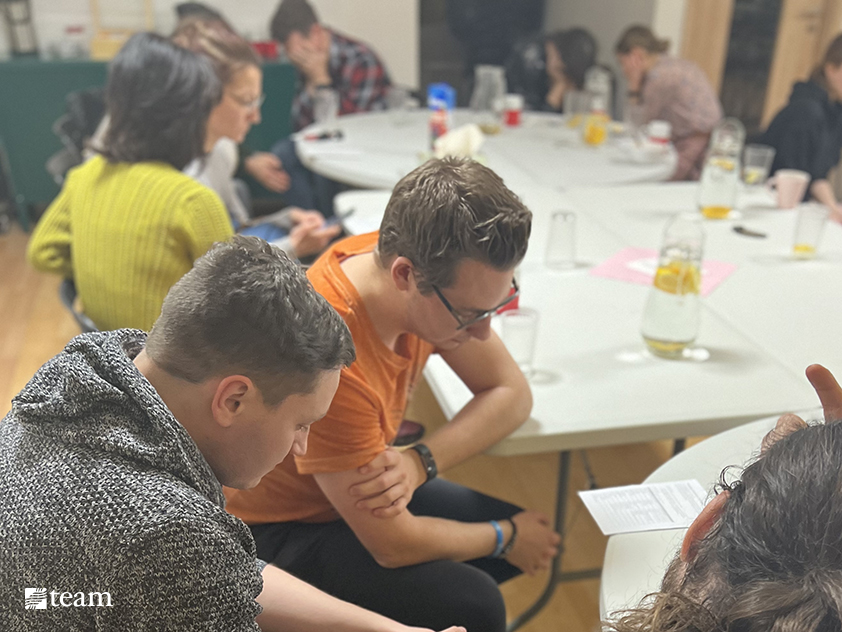
Ministry Updates
Blessed are the Flexible
April 4, 2023
by Anonymous Missionary

In this series of TEAM Ministry Updates, we’re sharing stories that highlight each of TEAM’s defining values. The following narrative is shared by “Samantha” (name changed), a TEAM Ukraine global worker, as an example of the value of “Creative Vision.”
A common saying among overseas workers is the adage, “Blessed are the flexible for they shall not be easily broken.” Although not technically numbered among The Beatitudes, this truth is one that all who minister cross-culturally should keep in the back of their minds. Maybe we should even cross-stitch it on a pillow and place it somewhere we have to look at it daily!
When global workers get together, even if we come from diverse places, we can all laugh at the moments when we learned this “cross-stitchable” truth the hard way. Most of the first term overseas is made up of thousands of moments where flexibility keeps you from breaking under the pressures and stressors, and everything that’s so new about your host country.
I like to think I’m a fairly flexible person. After serving in Ukraine for seven years, I had not “seen it all,” but I had seen enough to know that how you imagine something to turn out is often categorically opposite of what happens. So many factors of daily life as a cross-cultural worker are beyond our control. Buses are late or never arrive. The store is out of chicken. The officials at the migration office inexplicably go on a two-hour smoke break and never return. The power turns off in the middle of baking a cake or during the spin cycle of the washing machine.
In fact, sometimes it’s even more jarring when what I plan for the week is accomplished; I truly don’t know what to do with myself!
Flexibility May Mean Sacrificing Our “Agenda”
Over the years in Ukraine, I certainly grew more flexible as a person. What was less welcome for me was when my ministry “agenda” needed to become flexible. Oof. Pride and flexibility aren’t things that go well together.
What about when the ministry I came to support shifts, or even dissolves? What if the “needs on the ground” I’ve spouted to supporters and churches end up being radically different, and instead there’s an entirely different set of needs (and resources to meet these needs)?
How will I choose to respond when local friends shoot down my grand ideas for what youth group should look like? What if no one comes to my carefully planned women’s Bible study but instead an acquaintance in crisis is regularly free to meet and talk for hours?
What will my attitude be when discipleship meetings don’t happen, but the Lord instead opens doors to serve as a support-raising coach and cross-cultural mentor for Ukrainians being sent as global workers? What if I’m not the one up front doing the ministry as I thought, but rather encouraging and equipping local friends to thrive in their ministries? What if none of my life looks like I thought it would?

A spirit of flexibility, creativity, and humility leads to the understanding that at its core, missions service means joining in the work God is already doing in the places we go.
Becoming a Partner and Cheerleader
It can be painful to see the differences between the ministry expectations I lugged to the field with me in three 50 pound checked bags seven years ago and the reality of what has actually been achieved in these short years.
And yet, I am in awe of so many things God has done that I could never have orchestrated. Those most hungry for Jesus and willing to follow Him no matter what weren’t the people I had expected. Some church members I thought were ready to help lead the ministry never did, and others I never expected were the first to sign up. When I thought I’d moved across the world to teach or lead, I instead found the vital importance of learning, listening, and coaching from the side. What was needed among the body of believers in our town in Ukraine was not my voice as an instructor but instead as a partner and cheerleader for local leaders.
Adapting to a Time of War
And perhaps the greatest test of flexibility yet came in February 2022 when the Russian invasion began. The onset of war meant that I had to leave Ukraine and find new locations and ways of serving. For my Ukrainian brothers and sisters, their lives were turned upside down as husbands, fathers, and sons became soldiers and families faced heartbreaking decisions of whether to stay or flee.
Yet even in unimaginable pain and heartbreak, I see our creative God at work in Ukrainians both at home in their country and abroad. So many Ukrainians have stepped up to serve their neighbors despite incredible hardship and risk, and God is using them to draw many people to Himself. As felt needs are met – like a safe place to spend the night or a hot cup of tea and groceries – thousands of Ukrainians hear the Good News of Jesus’ love for them and respond to His call. And instead of ministries dependent on foreigners or “ministry experts” to function, Ukrainian Christians start and lead ministries in their own exceedingly flexible, God-dependent, and extremely winsome way.
A Front-Row Seat
Now I write this as I’m about to head back to Europe. I begin a new chapter in cross-cultural life and ministry serving Ukrainians, only this time they’re foreigners doing life in a new country and language, living in the limbo of war. Talk about flexibility!
Life and ministry today look nothing like I expected before the start of the full-scale invasion. Yet the Lord in His creativity is doing things in me and around me I never could have imagined, and I’m excited to see what He will do in the months and years ahead. May I have the faith and flexibility to walk in step with the Lord into wherever He’s leading. Even if it’s in not a place or way I expected, I get a front-row seat to see His glory spread throughout the world.
Related articles


